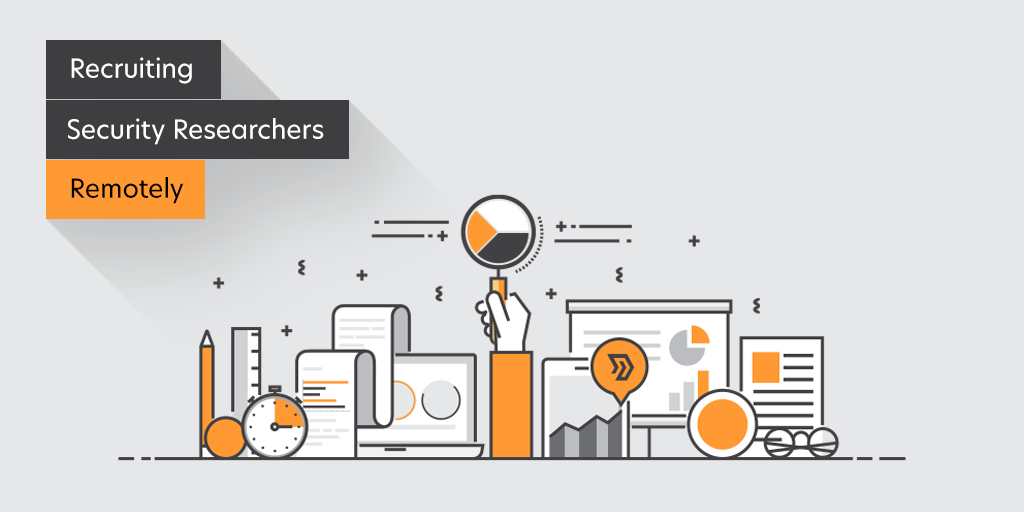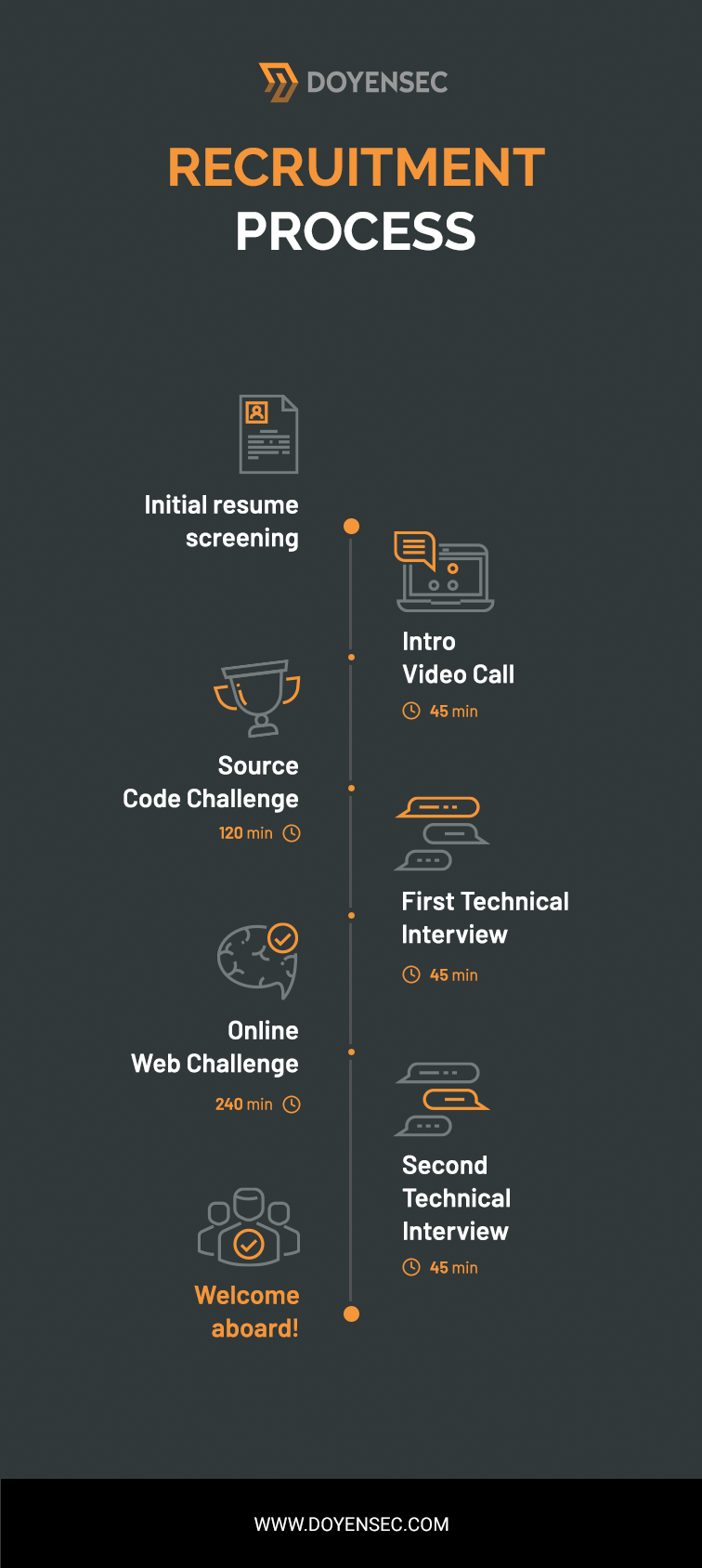Recruiting Security Researchers Remotely
09 Nov 2022 - Posted by Mateusz SwidniakAt Doyensec, the application security engineer recruitment process is 100% remote. As the final step, we used to organize an onsite interview in Warsaw for candidates from Europe and in New York for candidates from the US. It was like that until 2020, when the Covid pandemic forced us to switch to a 100% remote recruitment model and hire people without meeting them in person.

We have conducted recruitment interviews with candidates from over 25 countries. So how did we build a process that, on the one hand, is inclusive for people of different nationalities and cultures, and on the other hand, allows us to understand the technical skills of a given candidate?
The recruitment process below is the result of the experience gathered since 2018.
Introduction Call
Before we start the recruitment process of a given candidate, we want to get to know someone better. We want to understand their motivations for changing the workplace as well as what they want to do in the next few years. Doyensec only employs people with a specific mindset, so it is crucial for us to get to know someone before asking them to present their technical skills.
During our initial conversation, our HR specialist will tell a candidate more about the company, how we work, where our clients come from and the general principles of cooperation with us. We will also leave time for the candidate so that they can ask any questions they want.
What do we pay attention to during the introduction call?
- Knowledge of the English language for applicants who are not native speakers
- Professionalism - although people come from different cultures, professionalism is international
- Professional experience that indicates the candidate has the background to be successful in the relevant role with us
- General character traits that can tell us if someone will fit in well with our team
If the financial expectations of the candidate are in line with what we can offer and we feel good about the candidate, we will proceed to the first technical skills test.
Source Code Challenge
At Doyensec, we frequently deal with source code that is provided by our clients. We like to combine source code analysis with dynamic testing. We believe this combination will bring the highest ROI to our customers. This is why we require each candidate to be able to analyze application source code.
Our source code challenge is arranged such that, at the agreed time, we send an archive of source code to the candidate and ask them to find as many vulnerabilities as possible within 2 hours. They are also asked to prepare short descriptions of these vulnerabilities according to the instructions that we send along with the challenge. The aim of this assignment is to understand how well the candidate can analyze the source code and also how efficiently they can work under time pressure.
We do not reveal in advance what programming languages are in our tests, but they should expect the more popular ones. We don’t test on niche languages as our goal is to check if they are able to find vulnerabilities in real-world code, not to try to stump them with trivia or esoteric challenges.
We feel nothing beats real-world experience in coding and reviewing code for vulnerabilities. Beyond that, examples of the academic knowledge necessary to pass our code review challenge is similar (but not limited) to what you’d find in the following resources:
- CERT’s Java Coding Guidelines
- CERT’s Android Secure Coding Standard
- Apple’s Intro to app security for iOS and iPadOS
Technical Interview
After analyzing the results of the first challenge, we decide whether to invite the candidate to the first technical interview. The interview is usually conducted by our Consulting Director or one of the more experienced consultants.
The interview will last about 45 minutes where we will ask questions that will help us understand the candidates’ skillsets and determine their level of seniority. During this conversation, we will also ask about mistakes made during the source code challenge. We want to understand why someone may have reported a vulnerability when it is not there or perhaps why someone missed a particular, easy to detect vulnerability.
We also encourage candidates to ask questions about how we work, what tools and techniques we use and anything else that may interest the candidate.
The knowledge necessary to be successful in this phase of the process comes from real-world experience, coupled with academic knowledge from sources such as these:
- Mozilla’s Web security reference
- The Web Application Hacker’s Handbook
- The Tangled Web
- Examples of common Security Engineering interview questions
- OWASP’s Cheat Sheet Series
Web Challenge
At four hours in length, our Web Challenge is our last and longest test of technical skills. At an agreed upon time, we send the candidate a link to a web application that contains a certain number of vulnerabilities and the candidate’s task is to find as many vulnerabilities as possible and prepare a simplified report. Unlike the previous technical challenge where we checked the ability to read the source code, this is a 100% blackbox test.
We recommend candidates to feel comfortable with topics similar to those covered at the Portswigger Web Security Academy, or the training/CTFs available through sites such as HackerOne, prior attempting this challenge.
If the candidate passes this stage of the recruitment process, they will only have one last stage, an interview with the founders of the company.
Final Interview
The last stage of recruitment isn’t so much an interview but rather, more of a summary of the entire process. We want to talk to the candidate about their strengths, better understand their technical weaknesses and any mistakes they made during the previous steps in the process. In particular, we always like to distinguish errors that come from the lack of knowledge versus the result of time pressure. It’s a very positive sign when candidates who reach this stage have reflected upon the process and taken steps to improve in any areas they felt less comfortable with.
The last interview is always carried out by one of the founders of the company, so it’s a great opportunity to learn more about Doyensec. If someone reaches this stage of the recruitment process, it is highly likely that our company will make them an offer. Our offers are based on their expectations as well as what value they bring to the organization. The entire recruitment process is meant to guarantee that the employee will be satisfied with the work and meet the high standards Doyensec has for its team.
The entire recruitment process takes about 8 hours of actual time, which is only one working day, total. So, if the candidate is reactive, the entire recruitment process can usually be completed in about 2 weeks or less.
If you are looking for more information about working @Doyensec, visit our career page and check out our job openings.


